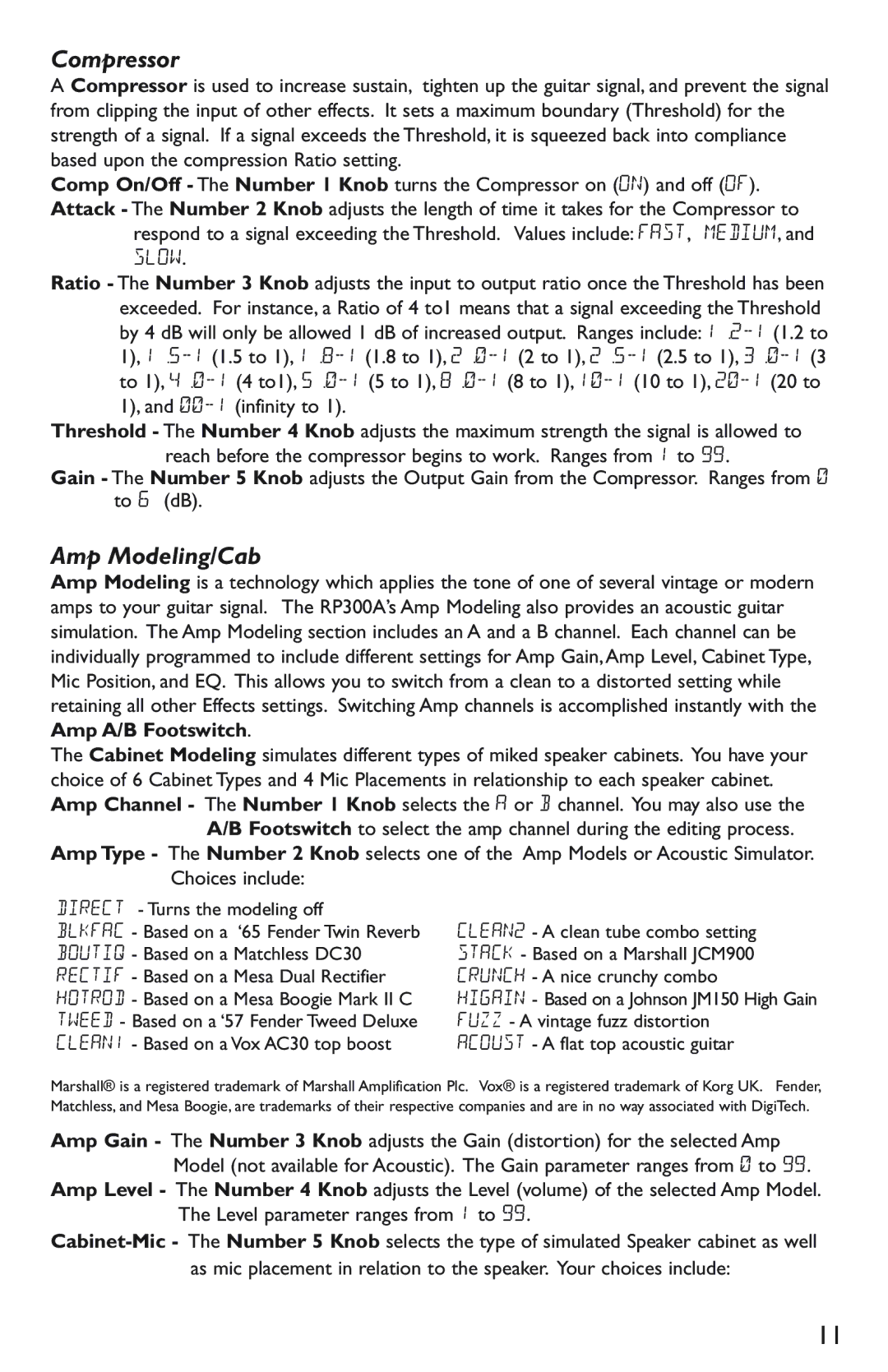Compressor
A Compressor is used to increase sustain, tighten up the guitar signal, and prevent the signal from clipping the input of other effects. It sets a maximum boundary (Threshold) for the strength of a signal. If a signal exceeds the Threshold, it is squeezed back into compliance based upon the compression Ratio setting.
Comp On/Off - The Number 1 Knob turns the Compressor on (ON) and off (OF). Attack - The Number 2 Knob adjusts the length of time it takes for the Compressor to
respond to a signal exceeding the Threshold. Values include: fast, meDIUM, and slOw.
Ratio - The Number 3 Knob adjusts the input to output ratio once the Threshold has been exceeded. For instance, a Ratio of 4 to1 means that a signal exceeding the Threshold by 4 dB will only be allowed 1 dB of increased output. Ranges include:
Threshold - The Number 4 Knob adjusts the maximum strength the signal is allowed to reach before the compressor begins to work. Ranges from 1 to 99.
Gain - The Number 5 Knob adjusts the Output Gain from the Compressor. Ranges from 0 to 6 (dB).
Amp Modeling/Cab
Amp Modeling is a technology which applies the tone of one of several vintage or modern amps to your guitar signal. The RP300A’s Amp Modeling also provides an acoustic guitar simulation. The Amp Modeling section includes an A and a B channel. Each channel can be individually programmed to include different settings for Amp Gain,Amp Level, Cabinet Type, Mic Position, and EQ. This allows you to switch from a clean to a distorted setting while retaining all other Effects settings. Switching Amp channels is accomplished instantly with the Amp A/B Footswitch.
The Cabinet Modeling simulates different types of miked speaker cabinets. You have your choice of 6 Cabinet Types and 4 Mic Placements in relationship to each speaker cabinet. Amp Channel - The Number 1 Knob selects the A or B channel. You may also use the
A/B Footswitch to select the amp channel during the editing process. Amp Type - The Number 2 Knob selects one of the Amp Models or Acoustic Simulator.
Choices include:
DIRECT - Turns the modeling off
BLKFAC - Based on a ‘65 Fender Twin Reverb BOUTIQ - Based on a Matchless DC30 RECTIF - Based on a Mesa Dual Rectifier HOTROD - Based on a Mesa Boogie Mark II C tweeD - Based on a ‘57 Fender Tweed Deluxe CLEAN1 - Based on a Vox AC30 top boost
CLEAN2 - A clean tube combo setting STACK - Based on a Marshall JCM900 CRUNCH - A nice crunchy combo
HIGAIN - Based on a Johnson JM150 High Gain FUZZ - A vintage fuzz distortion
ACOUST - A flat top acoustic guitar
Marshall® is a registered trademark of Marshall Amplification Plc. Vox® is a registered trademark of Korg UK. Fender, Matchless, and Mesa Boogie, are trademarks of their respective companies and are in no way associated with DigiTech.
Amp Gain - The Number 3 Knob adjusts the Gain (distortion) for the selected Amp Model (not available for Acoustic). The Gain parameter ranges from 0 to 99.
Amp Level - The Number 4 Knob adjusts the Level (volume) of the selected Amp Model. The Level parameter ranges from 1 to 99.
11
